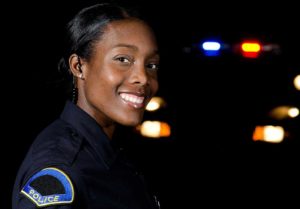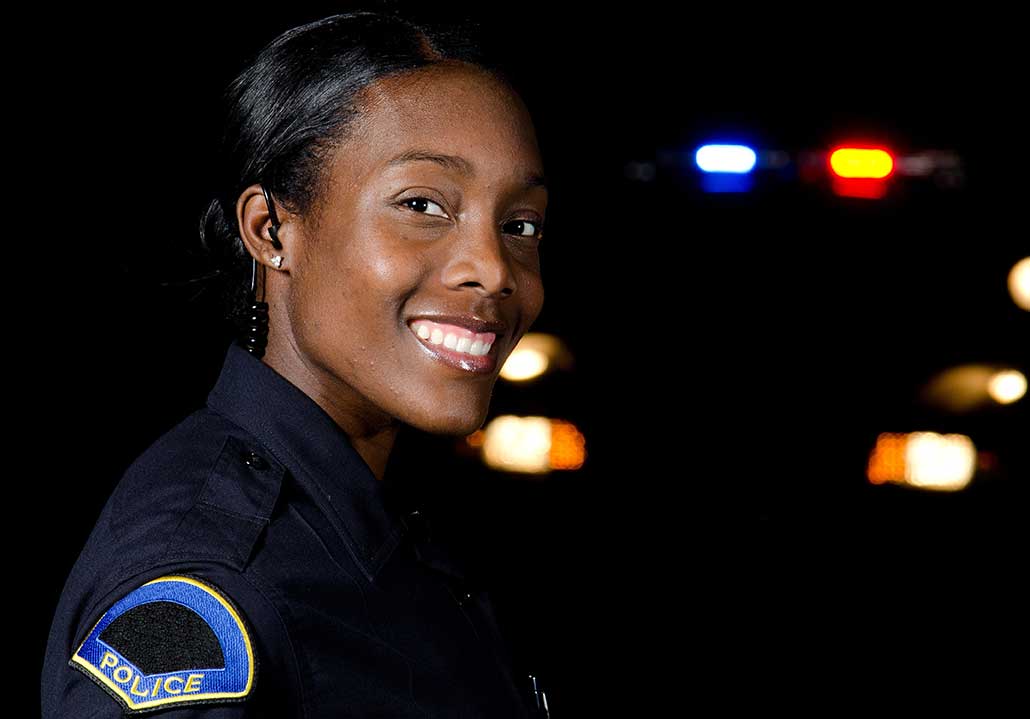Disclaimer: The information on our website is provided for general information purposes only. We make no representations or warranties of any kind, express or implied, about the completeness, accuracy, reliability, suitability or availability with respect to the website or the information contained on our website for any purpose. Any reliance on such information is therefore strictly at your own risk and we are not liable for any damages or losses arising out of or resulting from your reliance on any information contained on our website.
A police officer (cop) is sworn to defend and protect people. They can arrest and detain individuals who are accused of breaking the law. They ensure drivers follow traffic laws, respond to emergencies, and patrol areas where crime may occur. They often document any action they took in detailed reports.
Watch a video to learn what a police officer does.
How to Become a Police Officer
Step 1: Meet the Minimum Requirements
To become a police officer, you’ll need to earn your high school diploma or GED. Next, you must meet the age requirement of your state and pass a background check and drug test. You’ll also need to start your research on the requirements to attend a police academy in your state or area. Some states require you to have as much as two years of college courses to apply.
Step 2: Apply to a Police Academy
You must apply to be accepted into a police academy and pass to become a police officer. If the application does not require college courses, having college classes in the criminal justice field can increase your chances of being accepted though. You’ll also take a written test and pass a physical agility test. Scoring well on both of these will also increase your chances of being accepted. Check out an Entry Level Police Officer Examination Sample Test (link opens in a new tab).
Step 3: Attend a Police Academy
A police academy will train you in patrol, traffic control, firearm use, self-defense, first aid, and emergency response tactics. There is a lot to learn, so this takes about 6 months to complete. Upon completion however, you are promoted to Officer. Attending an academy is like having a full-time job. You will most likely attend your academy Monday through Friday for about 40 hours of training a week. You will also be paid.
Step 4: Optional: Continued Education
If you decide to advance your skills you can gain a college degree, especially if you want to become a detective, forensics expert, wildlife protection officer, or a federal government worker. Officers earn their bachelor’s degrees in criminal justice or law enforcement. Courses you’ll take include state and local laws, constitutional law, civil rights, and police ethics.
Job Description of a Police Officer

A police officer is usually assigned to a specific patrol area where they would be responsible to enforce the law, look for suspicious activity and may even search and/or arrest suspected criminals. They respond to emergencies, enforce traffic laws and would investigate complaints. Police officers often work with a partner and wear uniforms in order to be properly identified by the public.
In the police force, strong communication skills are needed as well as listening skills and are used on a daily basis in order to interact with the public, co-workers, supervisors and other teams such as in an emergency situation. They should be physically fit as the job often requires running, apprehending suspects and responding to emergencies of all kinds.
A police officer also works on specific crimes, for instance, special weapons and tactics (SWAT) teams, narcotics or even canine corps. However, one would usually have served for some length of time on patrol before advancing to these specific crime units. A police officer may also be assigned a designated area to watch for speeding violators in traffic. Some other areas of serving would be as a crime investigator, solving murders or other crimes. The police force is both a physically and mentally demanding career with a high-stress level and is considered very dangerous.
Free Teacher and Student Resources
The Constitutional Rights Foundation (link opens in a new tab) offers free teacher resources that provide education and discussion for your class.
Police Officer Career Video Transcript
Police patrol officers monitor community safety and respond to calls from the public. Whether on foot, on wheels, or on horseback, the job of patrol officers is to be alert for any threat to public safety, from enforcing traffic laws, to helping a lost child, or responding to an unfolding and highly dangerous situation. Police officers are licensed to carry guns, which comes with great responsibility. They must pass rigorous academic, psychological, and physical exams to prove they have what it takes to balance their responsibilities. Even in life-threatening situations, officers need to stay calm, think clearly and make good on-the-spot judgments.
While Hollywood makes police work seem constantly action-packed, most patrol officers will tell you the job is often very routine. Police work requires patience and paperwork, documenting every incident in detail. Officers are drug-free and have no felony convictions on their record, and those out in the community are expected to be physically fit. Some departments require a high school diploma, while others prefer a college degree in criminal justice, although other majors are often accepted. Speaking a second language is a plus. Police patrol officers are true public servants who are expected to conscientiously and courageously serve and protect.
Article Citations
Bureau of Labor Statistics, U.S. Department of Labor, Occupational Outlook Handbook, Police and Detectives.
National Center for O*NET Development. 33-3051.01. O*NET OnLine.
The career video is in the public domain from the U. S. Department of Labor, Employment and Training Administration.

